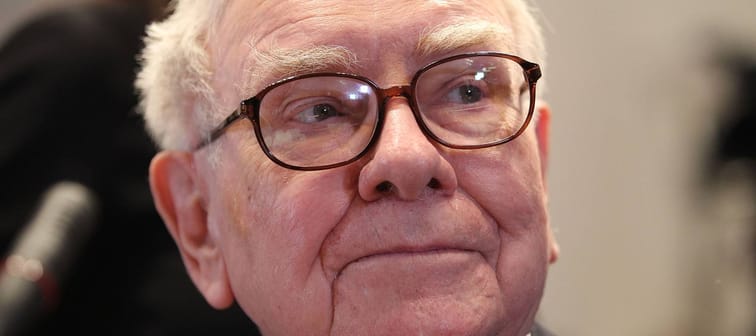Low-cost index funds
One reason why Buffett likes index funds is their relatively low cost compared to actively managed funds.
He told investors in his 2016 letter: “When trillions of dollars are managed by Wall Streeters charging high fees, it will usually be the managers who reap outsized profits, not the clients. Both large and small investors should stick with low-cost index funds.”
Since dishing out that advice, the world has experienced some pivotal moments. There’s been a global pandemic, several wars, extreme weather events and economic strife. Not to mention, an explosion of innovation around technology, in particular artificial intelligence, which has generated a lot of excitement in the business world.
Any of those things could — and probably should — make investors think twice about where they put their money. But Buffett has warned in the past not to dwell on dramatic headlines.
Reflecting on his first ever stock purchase — when he paid $114.75 to buy three shares of Cities Service preferred stock at age 11 in 1942 — he once told CNBC’s Becky Quick: “The best single thing you could have done on March 11, 1942 when I bought my first stock was just buy an index fund and never look at a headline, never think about stocks anymore.”
He added: “If you put $10,000 in an index fund and reinvested dividends … it would come to $51 million now. And the only thing you had to really believe in then is that America would win the war and that America would progress as it has ever since 1776 and that American business would move forward.”
If you’re keen to follow his advice, here are some successful low-cost index funds to consider.
Meet Your Retirement Goals Effortlessly
The road to retirement may seem long, but with WiserAdvisor, you can find a trusted partner to guide you every step of the way
WiserAdvisor matches you with vetted financial advisors that offer personalized advice to help you to make the right choices, invest wisely, and secure the retirement you've always dreamed of. Start planning early, and get your retirement mapped out today.
Get StartedVanguard S&P 500 ETF (VOO)
Buffett is a fan of the Vanguard S&P 500 ETF (VOO). In fact, he singled it out as his low-cost S&P 500 index fund of choice in his 2013 letter to shareholders.
VOO tracks the top 500 U.S.-based companies on the stock exchange and is generally considered to be a barometer of the health of the U.S. economy.
It gives investors exposure to the earnings of high-performing companies — including some of Buffett’s favorite stocks, like Apple, Bank of America Corp and Coca-Cola — without having to bet on each stock individually.
Since VOO’s inception in September 2010, as of Nov. 30, the fund has achieved an average annual return of 13.58%, just shy of the benchmark S&P 500 index, which returned 13.62% over the same period.
Another attractive element of VOO is its very low expense ratio of only 0.03%, much lower than the average expense ratio of similar funds, which is more like 0.79%.
Vanguard Real Estate ETF (VNQ)
If you’re not swayed by the stock market and are more interested in alternative assets, you may want to consider the Vanguard Real Estate ETF (VNQ).
VNQ tracks the performance of publicly traded real estate investment trusts (REITs) and other real-estate-related investments. It gives investors exposure to income-producing commercial real estate like apartment buildings, offices and industrial complexes.
While Buffett has shown little desire to buy and manage real estate, he has invested in several REITs over the years. These publicly traded property portfolios distribute at least 90% of their taxable income to shareholders in the form of dividends — and if you reinvest those dividends, you can achieve great compound growth over time.
Since VNQ’s inception in 2004, as of Nov. 30, it has achieved an average annual return of 7.18%, just shy of its benchmark index, which achieved 7.21%. The fund has another relatively low expense ratio of 0.12%.
Stop overpaying for home insurance
Home insurance is an essential expense – one that can often be pricey. You can lower your monthly recurring expenses by finding a more economical alternative for home insurance.
SmartFinancial can help you do just that. SmartFinancial’s online marketplace of vetted home insurance providers allows you to quickly shop around for rates from the country’s top insurance companies, and ensure you’re paying the lowest price possible for your home insurance.
Explore better ratesBerkshire Hathaway (NYSE:BRK.B)
Buffett recommends low-cost index funds for average traders, but that’s not how he made his fortune. Rather, he invested in individual stocks. If you want to follow in the billionaire’s footsteps, investing in his conglomerate Berkshire Hathaway (NYSE:BKR.B) is one way to get started.
Berkshire Hathaway is a holding company that owns a diverse range of private businesses in sectors like insurance, utilities and energy, freight rail transportation, finance, manufacturing, retail and services. It’s so diverse, it’s like a mini index fund in and of itself.
Berkshire Hathaway offers Class A stock (BRK.A) and Class B stock (BRK.B). BRK.A is the company’s original stock option and comes with a stratospheric price tag, most suitable for accredited and institutional investors. Meanwhile, BRK.B, first issued in 1996, is more modestly priced and affordable to smaller investors.
In the past decade, BRK.B stocks have shot up in value by around 204%. Year-to-date, as of Dec. 29, the stock is up nearly 16%. In the third-quarter of 2023, the conglomerate reported earnings per share of $4.96, beating its original estimate of $4.36.
In his 2023 Thanksgiving letter to shareholders, Buffett described Berkshire Hathaway as “one of the largest and most diversified companies in the world.”
He lauded the company’s longevity: “Decay can occur at all types of large institutions, whether governmental, philanthropic or profit-seeking. But it is not inevitable. Berkshire’s advantage is that it has been built to last.”
Sponsored
Follow These Steps if you Want to Retire Early
Secure your financial future with a tailored plan to maximize investments, navigate taxes, and retire comfortably.
Zoe Financial is an online platform that can match you with a network of vetted fiduciary advisors who are evaluated based on their credentials, education, experience, and pricing. The best part? - there is no fee to find an advisor.








